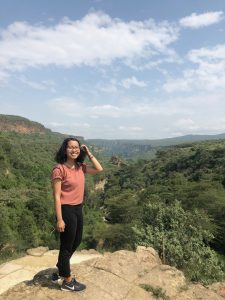

Year of Study During Placement: 4th year
Faculty and Major: Bachelor of Arts, Anthropology
Placement Course and Year: SOCI 495F, 2019
Placement Country: Kenya
Placement Organization: Carolina for Kibera
Nabila’s placement was with Carolina for Kibera, a community-based and led organization in Kibera, Nairobi. During her time there, she worked primarily with their Youth Health and Wellness Program participating in various projects which included the development of a curriculum for their sports development program, and the re-conceptualization of their youth health center through rigorous community-based participatory qualitative research and literature review based around youth health and development.
How did taking an academic course as a pre-req before you went on placement influence your experience / ability to conduct your main project?
The course attached to my placement was the SOCI 495F course on the applications of community-based participatory research. This course helped to provide me with a framework on how to do good and ethical research with community, and what I learned became something I would constantly refer back to and fall back on whenever I was in a state of confusion or uncertainty about my projects during my placement.
What did you learn through your ISL experience? What was your biggest challenge?
One of the main takeaways from this experience for me was the the importance and value of building communities. In doing work like CFK did, building strong relationships based on mutual trust and interest is essential in sustaining the good work organizations do for their communities. And to do that, it requires lots of time and communication.
The biggest challenge for me was dealing with uncertainty and discomfort during my placement. Like other ISL students, I was gripped with many of those moments and had to navigate through them. I found that I had much support from everybody involved, but ultimately it took a lot of self-reflection and assessing my own biases to learn to be comfortable with that discomfort. I was also fortunate enough to make lifelong friends in the process.
How has your participation in ISL influenced your life path, career, and/or academic trajectory?
My experience with the program has solidified my passions and interest in working with community on a grassroots level, and has shaped the way in which I encounter problems whether that be in doing research or in relationships with community. My experience has motivated me to merge my love for Anthropology with doing ethical, community-centred work and research.
What are you up to nowadays?
I am currently enjoying the short freedom I have being a fresh graduate, but I do have an internship position lined up doing similar work on a larger scale with a non-profit foundation starting this summer, and hopefully soon going to go for my master’s degree studying Applied Anthropology and Participatory Development.


